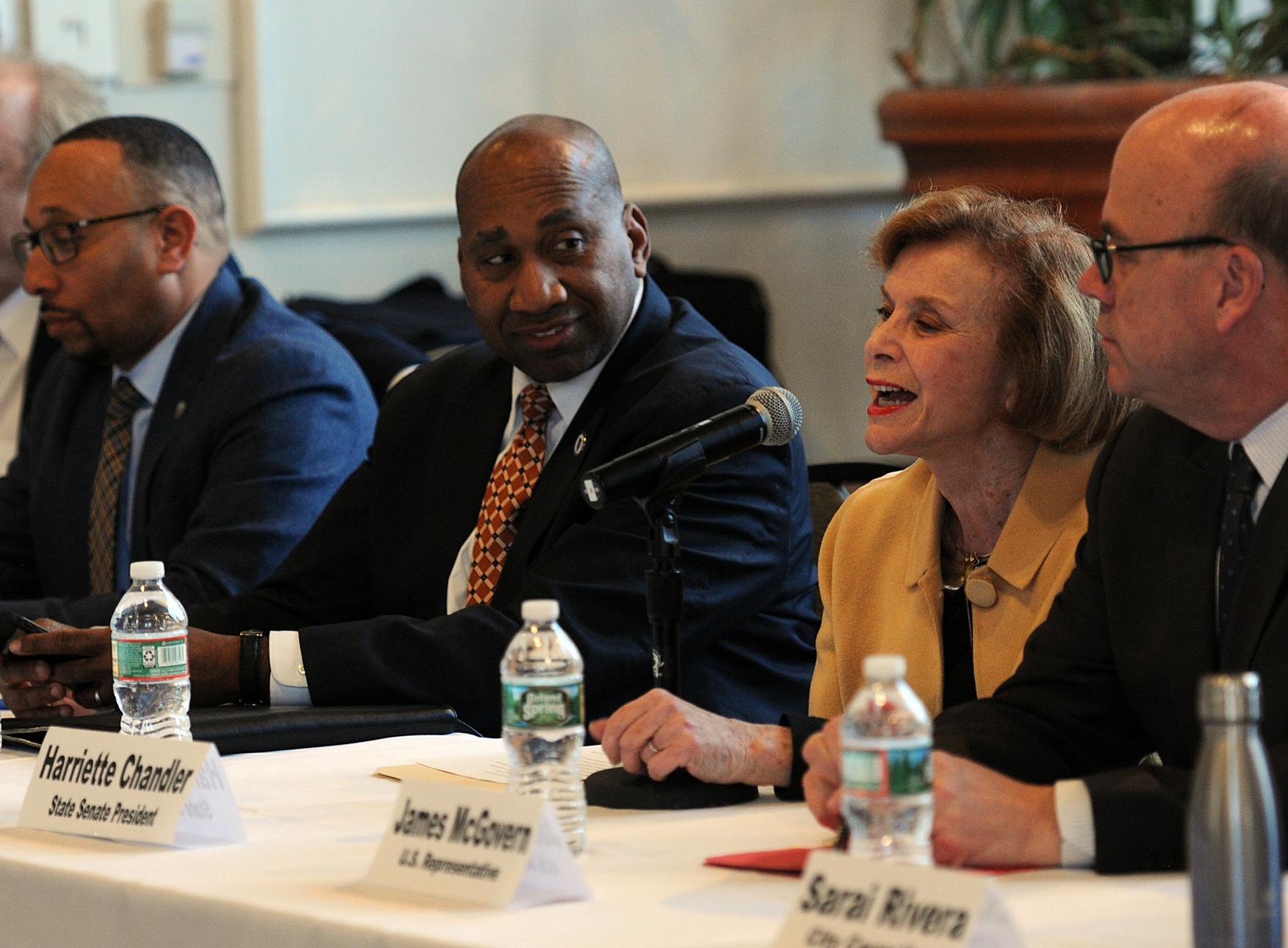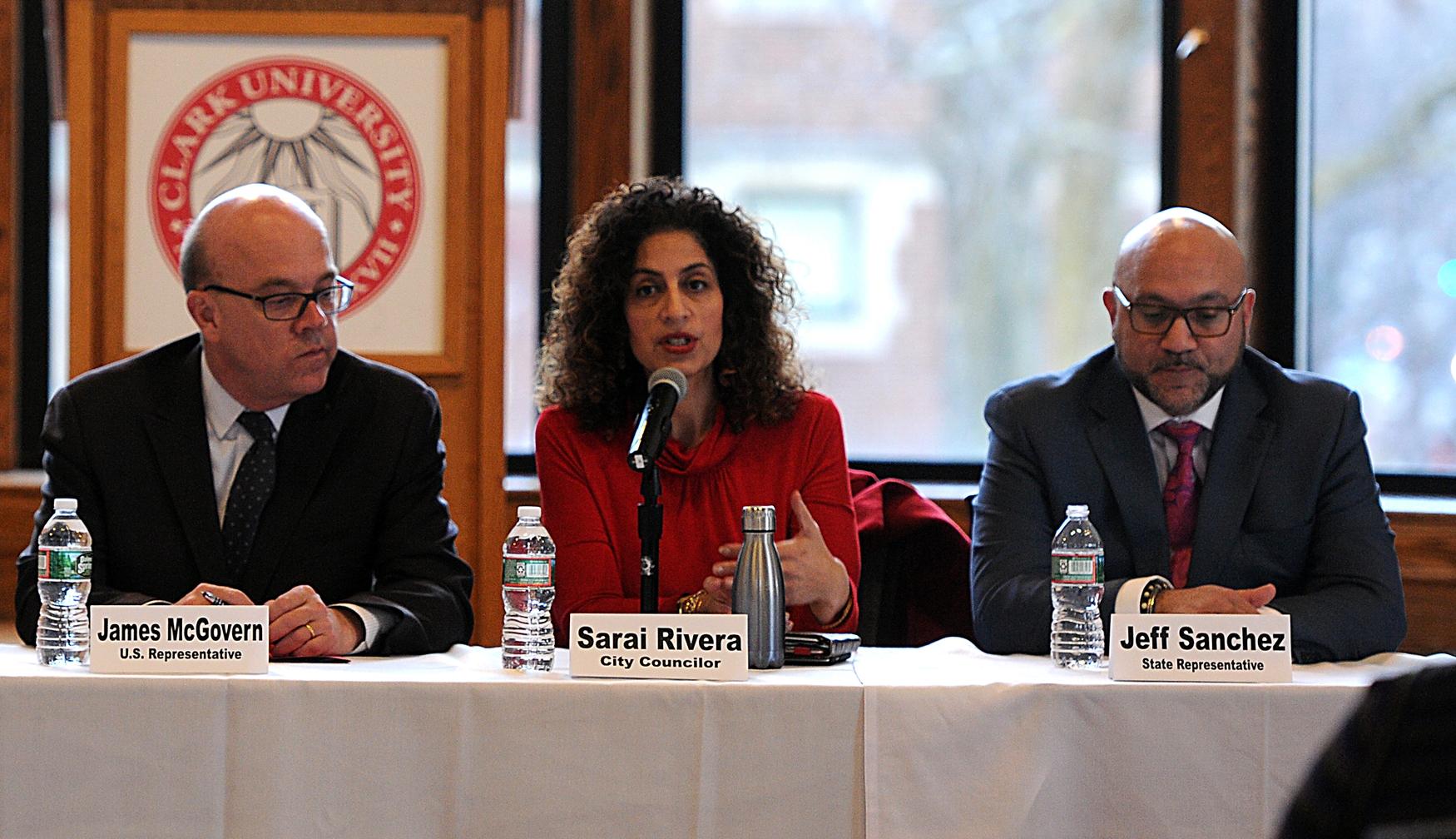
Massachusetts Senate President Harriette Chandler of Worcester speaks at Clark during a discussion Wednesday on increasing minority involvement in banking. At left is State Rep. Russell Holmes, D-Boston. [T&G Staff/Allan Jung]
By Cyrus Moulton
Telegram & Gazette Staff
March 28, 2018
WORCESTER – Edna Austell said she tried to work with five different banks to get a modification on her loan while her home went through foreclosure. But every time she sent in paperwork, the banks would say that something was missing and reject her application.
“They always play games with modifications,” Ms. Austell said. “This is not a game. This is my home.”
Ms. Austell’s story was one of many experiences, questions and comments shared with representatives of the banking industry, state and city politicians, and an audience of about 75 people gathered Wednesday night at Clark University for a forum on banking in minority communities.
The forum, organized by the group Communities of Color, was the second held in the state in recent months to discuss how banks can better interact with underserved communities.
“For too long bank policy has exacerbated the effects of poverty,” Mayor Joseph M. Petty said, noting that attendees driving from City Hall had not passed a single bank on the way to the forum in Main South.
Mr. Petty also noted that in Worcester, as many as 30 percent of people may not have a bank they use.
And that can leave those people behind.
“Economic development is not just for a select few,” said District 4 City Councilor Sarai Rivera, encouraging the audience to examine the roles that systemic racism, economic inequities and racism, and sexism can play in banking and economic development. “Let’s acknowledge this and let’s figure out what we can do.”
U.S. Rep. James P. McGovern agreed. “The point of gathering here today is to learn about what’s working, what’s not working, and how we can do better,” said the Worcester Democrat.
To that end, audience members had many questions and suggestions for the panel, which included representatives of banks large and small, including Leominster Credit Union, Bank of America and Santander.

Worcester City Councilor Sarai Rivera speaks at Clark University on Wednesday during state leaders’ listening tour on increasing minority involvement in banking. At left is U.S. Rep. James McGovern, D-Worcester, and at right is state Rep. Jeff Sanchez, D-Boston. [T&G Staff/Allan Jung]
Several audience members told personal stories of homes lost to foreclosure as the result of family tragedies such as an unexpected death or health care troubles.
They asked what happened to their cases, where they could turn for help, and where to even begin when dealing with the banks.
“I’m not asking for a handout, I’m asking for a hand up,” said a woman who identified herself as Caroline.
Many of the bank representatives, as well as Mullen Sawyer, executive director of the Oak Hill Community Development Corporation in Worcester, repeatedly vowed to meet with the individuals to help.
One panelist, state Rep. Russell E. Holmes, D-Boston, remarked that it was very apparent that the foreclosure crisis was not over.
Robert Thomas of Worcester asked why someone wouldn’t open a bank in places where check-cashing businesses proliferate.
Several people in the audience advocated for more financial literacy programs, whether for small nonprofit organizations, for high school students or for seniors.
Many of the banks representatives said that they offered such programs and were glad to work with residents to enroll.
Joe Corazzini of Worcester encouraged banks to look at diversity not just in their tellers, but in their board composition and organizational leadership. He also asked if banks would be willing to take foreclosed properties and provide them to families of color at low interest rates, noting that the government had at one time offered white families free land with the Homestead Act of 1862.
As the meeting closed, event facilitator Ronia Stewart said she was pleased that so many people had shared their struggles.
“What we intended to happen occurred tonight,” Ms. Stewart said.
But ultimately, she said, the issue is a community issue, not a money issue.
“We’ve got to do better as a community,” Ms. Stewart continued. “Money has no color. It all spends the same.”
